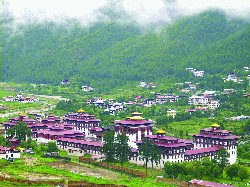Archives
Rocky start for Democracy in Bhutan
last week decided not to resign in shame but instead to form a loyal opposition – against 45 members of the royalist party. Indeed, on the same day as the two fledgling lawmakers agreed to join the parliament, a knot of protesters gathered in the capital of Thimpu to demand that the king bring back the absolute monarchy.
It has to be frustrating for the abdicating king, Jigme Singye Wangchuk, who has been trying for more than two years to turn his isolated kingdom into a democracy. Weaning his subjects away from the kingship, however, is not easy in a country whose relationship to its royalty stretches back through at least four generations of absolute monarchy, and to generations beyond count of previous dynasties as well.
Certainly, if this were a laboratory for democracy, Jigme supplied some of the very best equipment. He told a stunned nation in December 2005 that he would leave the throne in favor of his eldest son, the crown prince Jigme Khesar Namgyel Wangchuk. Parties were carefully prepared, with the royalist Bhutan Peace and Prosperity Party accepting a design of three flying birds as its poll symbol, while the People's Democratic Party used a white horse.
Using some of the world's best technology, including electronic voting machines imported from India, and running through two mock polls beforehand to educate Bhutan's isolated citizens on how to vote, the country held a first round of elections for the upper house of parliament in December and January. Then on March 24, Shangri-la stepped into the abyss. The date was declared a national holiday. With nearly 40 international observers looking on, Bhutan took the final step to convert to multiparty democracy.
Then on March 24, Shangri-la stepped into the abyss. The date was declared a national holiday. With nearly 40 international observers looking on, Bhutan took the final step to convert to multiparty democracy.
It might well have been the most scrupulously non-partisan election ever held in Asia. Members of the royal family and Buddhist clerics were barred from voting. The counting began immediately after the polls closed, and the result was broadcast live through the Bhutan Broadcasting Service and Bhutan Radio. Nearly 80 percent of 318,465 registered voters exercised their franchise.
But as for multiparty democracy, the Bhutan Peace and Prosperity Party (Druk Phuensum Tshogpa) headed by former Prime Minister Jigme Y Thinley and closely allied with the king, won 45 of 47 constituencies. Palden Tsering, the winning party’s spokesman, told reporters that nobody expected such a landslide. "What I can say is the people have decided," he said. The defeat for the opposition was so overwhelming that opposition leaders decided to resign from the National Assembly, the lower house of parliament.
"Two members in the opposition bench will hardly form an influential opposition," Tashi Tsering, the People's Democratic Party’s spokesman, told reporters in the capital of Thimphu.
The luckless opposition argued that while their candidates had been received by rural people with great enthusiasm, the dominant party abused its position and violated campaign guidelines. Later, the opposition decided to just resign their two seats, a move that was reversed later.
Parliament is expected to open next month, when the king invites the leader of the majority party to form the government for a five-year term. Before the government starts functioning, a speaker to the lower house will be elected. Meanwhile, Jigme Y Thinley has taken over as Bhutan's first elected Prime Minister. It was understood with the offering of Dakyen (ceremonial scarf) by the King to Mr. Thinley.
The isolated Buddhist kingdom sandwiched between India and Tibet (China) is known for its unique measure of the standard of living, the Gross National Happiness index rather than the internationally recognized Gross Domestic Product. Smoking is banned throughout the country, with education and health care facilities provided free for every Bhutanese citizen. Television didn't appear until 1999. The Internet followed later.
Tashme, the PDP leader, who spoke to this writer from party offices in the capital, acknowledged that Bhutanese voters felt the king had asked Jigme Thinley to form the DTP, and that the party capitalized on its perceived alliance with the royalists.
Certainly, the royalist election manifesto tried to exploit the happiness effect, saying "In pursuit of gross national happiness, growth with equity and justice, we offer our unwavering allegiance to the sacred institution of monarchy, the life-force of our nation and dedicate ourselves to realizing the vision of the Fourth Druk Gyalpo (king), His Majesty Jigme Singye Wangchuck, for a united, progressive and happy country," adding "We shall be guided by His Majesty the King, Jigme Khesar Namgyel Wangchuck, in our pursuit of Gross National Happiness through a true and vibrant democracy."
Some PDP candidates alleged that the electronic voting machines had produced skewed results, a charge rejected by an Indian election official. "The largest democracy on the globe (India) has been using electronic machines for many years with perfect results. Moreover, the Indian chief election commissioner categorically declared that the machines were foolproof," stated the election officer, who is based in Guwahati.
"I agree that there should have been a stronger opposition for a successful democracy in our country," said a Thimphu-based political commentator adding, "But now we cannot help, but accept the verdict of the polls."

